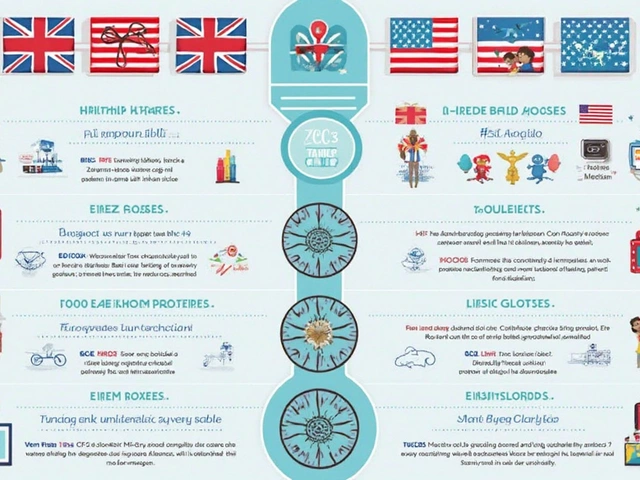When it comes to academic achievements, numbers can often seem like the ultimate measure of success. A 3.8 GPA, a number that sits just shy of that ever-coveted perfect score, paints a picture of diligent study habits and academic prowess. But what does it truly mean in the grand scheme of scholarships and educational opportunities?
For students eyeing scholarships, a 3.8 GPA can be a golden ticket – it opens doors to a variety of opportunities that prioritize those in the upper echelon of their class. Many scholarships are specifically geared towards students who not only excel academically but also show promise in their future careers.
However, understanding how to effectively present your GPA on applications can make all the difference. It's not just about the number but what lies behind it: the dedication, the late-night study sessions, the juggling act between maintaining grades and a passion for activities outside the classroom.
- Defining the 3.8 GPA
- Scholarships that Value a High GPA
- Importance of GPA in College Admissions
- Balancing GPA with Extracurricular Activities
- Improving and Maintaining a 3.8 GPA
- Tips for Scholarship Applications
Defining the 3.8 GPA
In the landscape of academics, the GPA, or Grade Point Average, is not just a number. It is a reflection of a student's academic performance, often seen as a benchmark that gauges one's commitment and understanding of their subjects. A 3.8 GPA lies tantalizingly close to the pinnacle of excellence, typically out of a 4.0 scale. It indicates that a student has consistently achieved grades in the range of A- to A, showing remarkable proficiency and consistent dedication across their coursework. Schools use GPAs to evaluate a student’s performance, and a 3.8 is widely accepted as a top-tier score, especially in competitive contexts where academic rigor is paramount.
To put it into context, a 3.8 GPA translates into an average score of about 90-92% in most educational systems. This is no mean feat and tends to be reflective not just of natural aptitude but also a strong work ethic. Academic environments, whether high school or college, often use GPAs as a summary statistic that encapsulates a student’s academic journey over a semester or an entire academic year. Achieving and maintaining such a score means a student usually possesses excellent time management skills, keen intellectual curiosity, and often engages deeply with their domain of study. According to a report by the National Center for Education Statistics, the percentage of students graduating with honors, which correlates with high GPAs, is on the rise, suggesting a shift towards academic excellence.
"A high GPA demonstrates to colleges and scholarships that you are capable of performing well at the next level, a critical consideration," says Dr. Clara Hughes, a well-respected academic advisor and former dean of admissions at several elite institutions.
While the GPA is an aggregate measure, it is essential to recognize that schools and universities weigh it differently. For instance, some institutions might use weighted GPAs that factor in the difficulty level of courses, meaning Advanced Placement (AP) or Honors classes boost the student's average more than standard classes. This means a 3.8 GPA might look even more impressive if the coursework was particularly challenging. On the other hand, other schools may apply an unweighted system, where all classes contribute equally, which still positions a 3.8 as an outstanding performance.
For students aiming at scholarships, understanding the nuances of their GPA can guide them in targeting the right opportunities. Many scholarships set minimum GPA requirements to sift through applicants efficiently, and a 3.8 often places students in an advantageous starting position. It is crucial for students to be aware of these distinctions and align their academic efforts with the expectations of potential scholarship providers. This proactive approach can maximize the benefits of their academic achievements.
But what of the broader implications of possessing such a GPA? A 3.8 is often more than just a number used by admissions committees or scholarship panels. It is an avenue through which students can gain access to some of the finest academic opportunities, providing leverage when applying to prestigious programs or internships. Maintaining or aspiring to a GPA like 3.8 also necessitates balancing academic effort with extracurricular engagement, fostering a well-rounded profile that educational institutions and scholarship boards highly value.
In conclusion, defining a 3.8 GPA is about understanding its positioning within the academic grading system and acknowledging the hard work and discipline it represents. It's a testament to a student’s persistence and talent, offering a gateway to numerous academic and professional opportunities.
Scholarships that Value a High GPA
In the vast landscape of educational funding, scholarships specific to GPA scores represent a crucial pathway for many students seeking to ease the financial burden of college life. A key component to securing such scholarships is a solid academic record, with a GPA like 3.8 often being the sweet spot. This score signifies both consistency and excellence, qualities highly coveted by scholarship committees. Many scholarships recognize and celebrate this level of academic diligence, rewarding students not just for their grades but also for their potential to continue this trajectory of success in higher education. Institutions such as the National Merit Scholarship and the Coca-Cola Scholars Foundation are keenly interested in applicants who demonstrate such academic dedication.
Some scholarships are tailored exclusively for high achievers with a robust GPA. For instance, the Rhodes Scholarship, although known for its competitive nature, frequently lists high academic performance as one of its many requirements. Likewise, state-funded scholarships often allot a portion of funds specifically for students that maintain a GPA above a certain threshold, making many forms of financial aid available to students recognized for their academic excellence. According to a report by the National Association of Student Financial Aid Administrators, students with GPA scores of 3.8 and above have a significantly higher chance of receiving merit-based awards, emphasizing how vital academic performance is in the realm of educational funding.
High GPA scholarships aren't merely about perfect grades in isolation. They also demand a robust portfolio demonstrating a student's leadership, community involvement, and vision for the future. As Dr. Anne Hildreth, an expert in college admissions, once noted:
"A high GPA signals commitment and resilience, but it's only one part of a student's story. Scholarship opportunities often require a narrative that shows how a student's academic skills can translate into real-world impact."Recognizing that many of these scholarships have a holistic approach, students must also focus on how their academic skills can address broader societal challenges, thus enhancing their applications beyond mere numbers.
Moreover, the influence of a solid GPA extends beyond securing immediate financial assistance. It can also affect long-term educational prospects. For instance, universities may offer additional resources and exclusive campus opportunities to high-achieving students. This effect creates a compounding benefit where a strong GPA not only makes education more affordable but also enriches the overall experience and potential lifelong connections. Students are thus encouraged to regard their GPA not as an endpoint for scholarship eligibility, but as a step towards broader aspirational goals that extend beyond the classroom. This perspective drives the desire to maintain good academic standing throughout one’s educational journey.

Importance of GPA in College Admissions
A GPA is often the initial number that catches the eye of college admissions officers, serving as a reflection of a student’s academic journey throughout high school. A 3.8 GPA is particularly impressive, suggesting consistent performance across various subjects and a deep commitment to scholastic diligence. Colleges and universities place great weight on GPA as they aim to admit students who exhibit not just potential, but proven achievement. That consistent excellence across different classes often speaks volumes about an applicant’s readiness for the rigors of higher education.
"A high GPA does not just reflect hard work; it often signals to us the student's ability to manage time effectively," says Dr. Miller, an admissions officer at a renowned university.
Moreover, during the admissions process, a strong GPA can significantly affect your standing. Colleges use these grades to gauge an applicant's preparedness and to project how likely they are to succeed if admitted. Students with higher GPAs may have an upper hand, especially in select programs with competitive entrance requirements. A GPA image of high distinction can often allow leeway in other areas of the application which might not be as polished. This doesn’t mean focus should shift solely on academics; rather, it points out just how essential balancing GPA with other accomplishments can be.
In another respect, a reliable GPA is indispensable when colleges predict retention rates. Students who have maintained a high GPA are often seen as more likely to continue and complete their college education, which in turn affects a university's reputation and rankings. Hence, students who boast a 3.8 GPA could find themselves more attractive to prestigious institutions. Plus, specific scholarships from these colleges often demand high GPA scores, intertwining academic success with financial advantages. Having a robust GPA provides opportunities not only for acceptance but also for merit-based financial aid.
It is crucial to note that while the GPA is a vital component, extracurricular activities, essay quality, and standardized test scores still round out the student profile. However, a high GPA offers a lens through which admissions committees can view the applicant’s discipline and intellectual curiosity. When looking at applications, committees often prioritize scholarships applicants by their GPA, making it a pivotal piece of the puzzle when aiming for scholarships designed for academic high flyers.
Balancing GPA with Extracurricular Activities
Achieving a 3.8 GPA is undeniably commendable and can open a myriad of scholarship opportunities. However, maintaining such a strong academic performance while engaging in extracurricular activities requires more than just intelligence; it demands exceptional time management and a good sense of balance. Many students often find themselves at a crossroads, trying to excel academically while also wanting to pursue interests that lie outside the traditional classroom setting. These activities are not just a mere feather in one's cap; they contribute significantly to personal development, enhancing skills such as leadership, teamwork, and creativity. But the challenge lies in not letting these interests distract you from maintaining your stellar GPA. It's crucial to devise a plan that allows for both academic excellence and personal growth through activities that you are passionate about. Prioritizing tasks, making use of planners, and setting realistic goals are all effective strategies in juggling these important facets of student life.
One practical tip is to create a weekly schedule that incorporates study times and specific slots for extracurricular pursuits. Breaking projects into smaller, manageable tasks can prevent last-minute rushes and reduce stress significantly. Those late-night cram sessions often lead to burnout, which can negatively impact both areas. Understanding your own peak productivity hours—times when you are most alert and focused—can help you assign demanding tasks such as studying for exams at optimal times. Conversely, lighter activities such as club meetings or sports practice can be slotted into more relaxed periods. If time management is done effectively, it can also provide students with a sense of achievement, knowing that they are effectively harnessing their full potential both in the classroom and beyond. Remember, it’s important to strike a healthy balance to ensure that you're not spreading yourself too thin.
"Academic qualifications are important and so is financial education. They're both important and schools are forgetting one of them." – Robert Kiyosaki
It’s worth noting that many colleges and scholarship committees appreciate well-rounded individuals. Students who show they can balance rigorous academic coursework with rich, meaningful participation in extracurricular activities often stand out during the application process. These activities provide practical experiences that extend learning beyond textbooks, helping students develop into adaptable individuals who are ready to take on diverse challenges. From a strategic perspective, engaging in activities that align with your intended field of study can be particularly beneficial. This not only reflects dedication to your chosen career path but also demonstrates to scholarship panels a proactive step towards hands-on learning in your area of interest.
To assist with both academic and extracurricular efforts, leveraging technology can also be incredibly beneficial. There are numerous apps and tools designed to help students stay organized, meet deadlines, and even maximize productivity. Utilizing these digital tools can help automate routine tasks, leaving you more time and energy to focus on what truly matters—whether it's nailing that upcoming chemistry test or shining on the debate team. Apps like Google Calendar or even task management software like Trello can keep you on track and help visualize your commitments in a clearer manner. That said, while tech can provide support, it's still essential to be disciplined and stick to the plans and schedules you set for yourself. In this fast-paced era, balancing both academics and extracurricular engagements is not just about adding lines to your resume; it's about building a comprehensive portfolio of skills and achievements that will aid you in your future endeavors.

Improving and Maintaining a 3.8 GPA
Achieving a 3.8 GPA is no small feat, but maintaining it can be a whole different battle. It's a mix of strategy, discipline, and a little bit of trial and error. First, it's crucial to understand your study habits, as tweaking them can sometimes be the key to unlocking higher academic performance. According to many educational experts, creating a personalized study schedule that aligns well with your peak productivity hours can significantly enhance your learning efficiency. Some students find it easier to study in the morning when their minds are fresh, while others thrive during the quiet of the evening.
Another vital aspect is to stay organized. Keeping track of assignments, tests, and deadlines might sound like a no-brainer, but it's easy to become overwhelmed as tasks mount. Utilize digital tools like planner apps or the traditional paper agenda to map out your academic tasks. It's also important to break down your workload into manageable chunks, thereby reducing the risk of burnout. As part of nurturing a strong GPA, students should not shy away from reaching out for help when needed. Most schools offer resources such as tutoring centers or workshops, and there's no shame in seeking guidance from professors during office hours or in online discussion forums.
Leveraging Academic Resources
Making the most of the academic resources available to you is another solid strategy. Whether it's forming or joining study groups, attending review sessions, or accessing resources provided by your instructors, these can give you an extra edge. Study groups, in particular, offer the opportunity to engage with peers who might explain concepts differently than instructors, sometimes making complex ideas more digestible. Remember, persistent and active engagement in your classes can lead to a deeper grasp of the material, which ultimately reflects in your grades.
Albert Einstein once said, "Intellectual growth should commence at birth and cease only at death." This mirrors the continuous effort needed to keep your GPA at its best.
It's also worth considering online platforms that offer extra learning materials. Websites like Khan Academy or Coursera provide supplementary courses that can aid in both understanding and retaining course material. This independent exploration not only keeps things fresh but broadens your knowledge base, which can be advantageous in coursework and exams.
Balancing Life and Study
While nurturing your academic record is essential, remember that there's a life beyond books. Balance is key for long-term success and wellbeing. Ensuring that your overall lifestyle includes downtime will help you maintain your GPA in the long run. Hobbies, socializing, and physical activities are not just leisure activities – they contribute to a well-rounded individual, reducing stress and keeping burnout at bay. Mindfulness techniques and regular exercise can play an instrumental role in maintaining a strong mental state, which is crucial for academic perseverance. Understanding the importance of balance paves the way for sustainable academic and personal growth.
Tips for Scholarship Applications
Securing a scholarship can be a game-changer in your academic journey. It not only alleviates the financial burden of educational expenses but also serves as a testament to your academic prowess. Whether you're a high school freshman or preparing to graduate, understanding the nuances of scholarships can give you a significant edge. The process might seem daunting, but it's all about presenting what you bring to the table.
First things first—know your timeline. Different scholarships have various deadlines throughout the year, and it's crucial to map these out well in advance. Create a calendar as soon as you begin your college search, marking the application deadlines of each scholarship that interests you. This organization will help you in managing multiple applications without any last-minute rush.
Familiarize yourself with the application criteria. Most scholarships demand more than just a high GPA; they look for well-rounded individuals who balance academics with extracurriculars. Highlight your achievements in leadership roles, community service, and any extracurricular activities you're passionate about. Admissions boards like to see an active, engaged lifestyle that contributes to communal and personal growth.
Crafting a compelling essay is often at the heart of a scholarship application. Here's where you get to shine beyond numbers and letters. Pour your story, your inspirations, and your aspirations into an essay that stands out. Remember, authenticity is key. Speak from the heart, and make sure you convey a sense of purpose and passion for the field of study you're entering.
"The most powerful person in the world is the storyteller," as Steve Jobs famously asserted. Use your personal narrative to captivate, inform, and connect with the selection committee.
Your letters of recommendation are another vital component. Choose mentors, teachers, or professionals who know you well and can expound on your strengths and character. Go beyond the standard request and share your motivations and recent accomplishments with them to ensure their letters are as personalized and impactful as possible.
Don’t overlook the financial section. This part might feel uncomfortable—discussing finances isn't always easy. However, truthfulness and clarity in financial need can make a significant difference in your application. If open about your situation, some scholarships may provide more aid than originally mentioned.
Finally, proofread everything. Mistakes in grammar, spelling, or formatting can detract from the meticulousness of your application, so leave no room for error. Have a trusted individual review your application and provide suggestions before you submit it.
To wrap up, be proactive and resourceful. There’s a world of opportunities out there, and they start with a well-prepared application. By paying attention to detail, you’re positioning yourself closer to the scholarship you deserve and paving a smoother path to college success.






